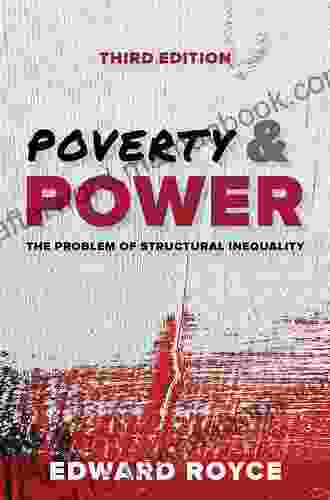Poverty and Power: The Problem of Structural Inequality

Poverty is a complex and multifaceted issue that affects millions of people around the world. It is often defined as a lack of access to basic necessities such as food, water, shelter, and healthcare. Poverty is not simply a matter of individual misfortune, but rather a systemic problem that is rooted in the way our societies are organized.
One of the key factors that contribute to poverty is structural inequality. This refers to the ways in which social, economic, and political systems create and perpetuate unequal opportunities for different groups of people. Structural inequality can manifest itself in many ways, such as discrimination, lack of access to education and employment, and inadequate social safety nets.
4.3 out of 5
| Language | : | English |
| File size | : | 4779 KB |
| Text-to-Speech | : | Enabled |
| Screen Reader | : | Supported |
| Enhanced typesetting | : | Enabled |
| Word Wise | : | Enabled |
| Print length | : | 378 pages |
In this article, we will explore the problem of structural inequality and its impact on poverty. We will discuss the different factors that contribute to structural inequality, and we will consider some of the ways that we can work to overcome it.
The Causes of Structural Inequality
There are many factors that contribute to structural inequality. Some of the most common include:
- Discrimination: Discrimination is a major barrier to economic and social mobility. It can take many forms, such as racism, sexism, xenophobia, and homophobia. Discrimination can prevent people from accessing education, employment, and other opportunities, and it can lead to poverty and social exclusion.
- Lack of access to education: Education is one of the most powerful tools for overcoming poverty. It provides people with the knowledge and skills they need to get good jobs and earn a decent living. However, many people around the world do not have access to quality education. This is due to a number of factors, such as poverty, discrimination, and lack of infrastructure.
- Lack of access to employment: Another major factor that contributes to poverty is lack of access to employment. This can be due to a number of factors, such as discrimination, lack of skills, and economic downturns. When people do not have access to good jobs, they are more likely to fall into poverty.
- Inadequate social safety nets: Social safety nets are essential for protecting people from poverty. They provide a basic level of income and support for people who are unable to work or who are facing financial difficulties. However, in many countries, social safety nets are inadequate or non-existent.
The Impact of Structural Inequality on Poverty
Structural inequality has a devastating impact on poverty. It creates a cycle of disadvantage that is difficult to break. People who are born into poverty are more likely to experience discrimination, lack of access to education and employment, and inadequate social safety nets. This makes it very difficult for them to improve their lives and escape poverty.
Structural inequality also has a negative impact on economic growth. When people do not have equal opportunities to succeed, it stifles innovation and entrepreneurship. This can lead to lower productivity and economic stagnation.
Overcoming Structural Inequality
Overcoming structural inequality is a complex challenge, but it is essential for creating a more just and equitable world. There are a number of things that we can do to address this issue, including:
- Enacting anti-discrimination laws: Anti-discrimination laws are essential for protecting people from discrimination based on their race, gender, religion, sexual orientation, or other characteristics. These laws help to create a more level playing field and give everyone a fair chance to succeed.
- Investing in education: Education is one of the most powerful tools for overcoming poverty. We need to invest in quality education for all children, regardless of their background or circumstances. This means providing access to affordable early childhood education, K-12 education, and higher education.
- Creating jobs: We need to create more good jobs that pay a living wage. This means investing in infrastructure, supporting small businesses, and promoting economic growth. We also need to make sure that everyone has access to the skills and training they need to get good jobs.
- Expanding social safety nets: Social safety nets are essential for protecting people from poverty. We need to expand social safety nets to provide a basic level of income and support for all people, regardless of their employment status. This includes providing access to healthcare, food assistance, and housing assistance.
Poverty is a complex and multifaceted issue, but it is one that we can overcome. By addressing the problem of structural inequality, we can create a more just and equitable world for all.
4.3 out of 5
| Language | : | English |
| File size | : | 4779 KB |
| Text-to-Speech | : | Enabled |
| Screen Reader | : | Supported |
| Enhanced typesetting | : | Enabled |
| Word Wise | : | Enabled |
| Print length | : | 378 pages |
Do you want to contribute by writing guest posts on this blog?
Please contact us and send us a resume of previous articles that you have written.
 Top Book
Top Book Novel
Novel Fiction
Fiction Nonfiction
Nonfiction Literature
Literature Paperback
Paperback Hardcover
Hardcover E-book
E-book Audiobook
Audiobook Bestseller
Bestseller Classic
Classic Mystery
Mystery Thriller
Thriller Romance
Romance Fantasy
Fantasy Science Fiction
Science Fiction Biography
Biography Memoir
Memoir Autobiography
Autobiography Poetry
Poetry Drama
Drama Historical Fiction
Historical Fiction Self-help
Self-help Young Adult
Young Adult Childrens Books
Childrens Books Graphic Novel
Graphic Novel Anthology
Anthology Series
Series Encyclopedia
Encyclopedia Reference
Reference Guidebook
Guidebook Textbook
Textbook Workbook
Workbook Journal
Journal Diary
Diary Manuscript
Manuscript Folio
Folio Pulp Fiction
Pulp Fiction Short Stories
Short Stories Fairy Tales
Fairy Tales Fables
Fables Mythology
Mythology Philosophy
Philosophy Religion
Religion Spirituality
Spirituality Essays
Essays Critique
Critique Commentary
Commentary Glossary
Glossary Bibliography
Bibliography Index
Index Table of Contents
Table of Contents Preface
Preface Introduction
Introduction Foreword
Foreword Afterword
Afterword Appendices
Appendices Annotations
Annotations Footnotes
Footnotes Epilogue
Epilogue Prologue
Prologue Kim Diehl
Kim Diehl Koin
Koin Elizabeth Ann West
Elizabeth Ann West Suzanne Schlosberg
Suzanne Schlosberg Miguel Hebrero
Miguel Hebrero Maria Ann Green
Maria Ann Green Frank Rutledge
Frank Rutledge Jack Goldstein
Jack Goldstein Steven Lovink
Steven Lovink Michael Sisa
Michael Sisa Kerry J Donovan
Kerry J Donovan Scott Jansen
Scott Jansen Amelia Gorman
Amelia Gorman Abigail Wild
Abigail Wild Mark Schatzker
Mark Schatzker Lauri Hamalainen
Lauri Hamalainen Steven G Medema
Steven G Medema Susan Meyers
Susan Meyers Peggy Collins
Peggy Collins Alex L Moretti
Alex L Moretti
Light bulbAdvertise smarter! Our strategic ad space ensures maximum exposure. Reserve your spot today!

 Jorge Luis BorgesAre They Too Hard On Them Na: A Comprehensive Examination of the Term and Its...
Jorge Luis BorgesAre They Too Hard On Them Na: A Comprehensive Examination of the Term and Its... Ezekiel CoxFollow ·6.4k
Ezekiel CoxFollow ·6.4k Hugh ReedFollow ·2.7k
Hugh ReedFollow ·2.7k Corey GreenFollow ·10.1k
Corey GreenFollow ·10.1k Eddie BellFollow ·13k
Eddie BellFollow ·13k Terry BellFollow ·9.9k
Terry BellFollow ·9.9k Duane KellyFollow ·2.6k
Duane KellyFollow ·2.6k Ethan GrayFollow ·14.3k
Ethan GrayFollow ·14.3k Russell MitchellFollow ·11.5k
Russell MitchellFollow ·11.5k

 Bryce Foster
Bryce FosterViolin Is Easy: A Comprehensive Guide for Beginners
The violin is a...

 Cristian Cox
Cristian CoxThe True Story Of The Ivy League Cowboys Who Raided The...
In the early 2000s, a group of Ivy League...

 Ken Follett
Ken FollettUnraveling the Enchanting World of Menewood: A...
Embark on an enthralling...

 Phil Foster
Phil FosterNorth Poems by Seamus Heaney: An Exploration of Place,...
Seamus Heaney's North...

 Jack Butler
Jack ButlerFleeting Encounters: The Enigmatic Transience of Maria...
In the annals of literary history, fleeting...

 Eliot Foster
Eliot FosterA Haiku Summer: Capturing the Essence of the Season in...
Summer is a time of warmth,...
4.3 out of 5
| Language | : | English |
| File size | : | 4779 KB |
| Text-to-Speech | : | Enabled |
| Screen Reader | : | Supported |
| Enhanced typesetting | : | Enabled |
| Word Wise | : | Enabled |
| Print length | : | 378 pages |










